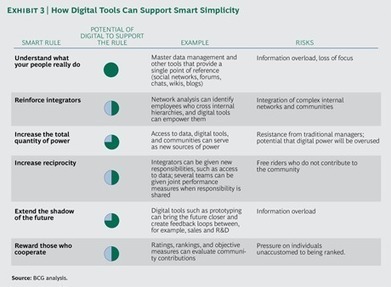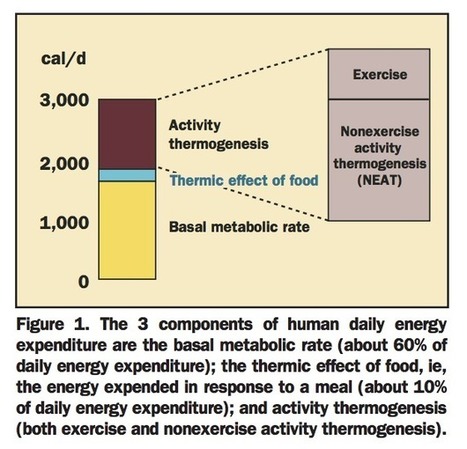 Your new post is loading...
 Your new post is loading...
At the age of 10, Benjamin Franklin left formal schooling to become an apprentice to his father. As a teenager, he showed no particular talent or aptitude aside from his love of books. When he died a little over half a century later, he was America's most respected statesman, its most famous inventor, a prolific author, and a successful entrepreneur. What happened between these two points to cause such a meteoric rise? Underlying the answer to this question is a success strategy for life that we can all use, and increasingly must use.
Via The Learning Factor
As we go through our daily-by-day lives without a pause or a moment to think about what it is we are actually doing, it's easy to assume we are working as effectively as we can. It is important to take that pause and observe others in action. Are we working as effectively as our extremely successful peers? Inspired by Stephen R. Covey's The 7 Habits of Highly Effective People, take a look at the things very successful people do and see how their habits aid them in achieving their maximum effectiveness. Want to become one of those highly effective people and no longer a bystander? Try these 7 habits and find your own success. 1. Be proactive Nothing will ever get done if we do nothing but sit around waiting for things to happen. Effective people know that there is no value in overthinking, in spending more time on our words than our actions. The most powerful thing anyone can do is simply take the reins in their own hands to instigate movement. 2. See the end While the process of action is undoubtedly important, sometimes the impetus for our most powerful, effective actions comes from knowing where the end lies. If we continue to keep that in mind, we'll be able to maximize our productivity to reach our highly desired, very rewarding end goal. 3. Prioritize When embarking on a task with many steps, it can be tempting to stop something halfway through when the going gets tough. What we should do, however, is actually push through. The difficulty of an action shouldn't change that it's our priority. 4. Visualize Effective people can always imagine a favorable outcome--even if one doesn't seem likely to be written in the books. When you feel bogged down, or your actions are simply not getting you where you want, practice visualization for a couple minutes. Visualize your goals and the steps you need to make to get you there. 5. Try to understand things beforehand Often, people jump into things without properly reading the instructions--ultimately resulting in ineffective actions far from the results they had previously envisioned. Setting aside adequate time to sort through and plan can really benefit your end results. 6. Synergize There is nothing more powerful than combining forces. Regardless of how competent we might be on our own, there is always greater strength in numbers. Synergize on everything you can--how much more effective you are may surprise you. 7. Renew and improve Last, one of the most important habits of all is that of self-care. We need to allow ourselves the time and space--not just once in a blue moon, but a bit here and there every day--in order to mend our burnt-out ends. Make time to regenerate and you will find that you are better able to effectively achieve your personal best.
Via The Learning Factor
Every day, each of us has 24 hours to spend. Some of us make better use of that resource than others. Learning to manage time and spend it wisely is among the most significant things you can do to build personal and professional success. Here are 65 of the best ways to manage your time:
Via The Learning Factor, Bobby Dillard
If you've ever tried to lose weight, quit smoking, train for your first half marathon, or reach some other lofty personal development goal, one thing becomes clear very quickly: establishing new habits is tough stuff. Chris Boyce feels your pain. He's the CEO at Virgin Pulse, a company partially held by Sir Richard Branson's Virgin Group that develops mobile and desktop apps aimed at helping workforces develop healthy habits. Its products are similar to those offered by consumer wellness companies--think a mobile feature that gently prods employees to make daily progress toward, say, a financial goal, and a wrist band similar to a Fitbit that tracks activity and sleep habits. But Virgin Pulse aims to compete mainly with wellness programs offered by insurance companies. Boyce says the difference with Pulse is that it strives to offer something responsive to employees’ desires, rather than prescribing specific actions or participation. And Pulse uses positive reinforcement to help people establish new habits. Inc. recently caught up with Boyce to discuss a five-pronged approach for making habits stick, regardless of whether you use a wearable device:
Via The Learning Factor
If you're like many of my clients prior to them seeing me, you might have a hard time getting started with projects and completing tasks. Maybe you do everything but what you need to be doing. Perhaps you watch TV instead of cleaning your house. You socialize instead of finishing a work project, or surf the Internet instead of writing that business plan you've been meaning to do for the longest time. You essentially avoid that which you deem to be uncomfortable. It’s an adaptive response to stress, fear, and anxiety. The problem with this tactic is, by putting off an important task, it ultimately leads to more stress, greater fear, more anxiety — and of course not completing the task. This procrastination can lead to feelings of guilt, inadequacy, and depression — all of which can kill motivation and creativity and perpetuate the unproductive cycle. Poor time management, feeling overwhelmed, unrealistic standards, or just plain laziness are a few possible reasons for procrastination.
Via The Learning Factor
When you want to move up in the workplace, your first instinct might be to ask yourself, “What can I add to my plate to impress people and really prove my worth around here?” That may seem like a smart question to ponder, but in my opinion, it’s not always the right question to start off with. Instead, here’s a good place to start: “What can I subtract from my current workload so that I can clear away some muck, free up my time and energy, and start contributing at the highest possible level?” In other words: “What should I be doing less of around here?” After working as a psychologist and life coach for over 28 years--mentoring super-achievers across all kinds of industries--what I have observed, time and time again, is that the secret to success isn’t doing more. It’s doing less. Here is a simple auditing exercise to help you critically examine your work week and decide which tasks to keep--and which you ought to delete.
Via The Learning Factor
It only takes seven minutes to change how you approach your day. Using the routine described below when you get to work will make a world of difference in your productivity, your attitude, your success, and your health. It's like the approach you make to the tee on a golf course. You plan out how you will hit the shot, which is more important than the actual swing. Before you start your day, this routine will provide the right mindset. Will you follow it? Note: I'm going to call this routine "The Seven," as in, "Did you do your Seven this morning?" Feel free to borrow that term or send me ideas on a better name.
Via The Learning Factor
I'm always surprised when people ask me about how to manage their time.
"This time management of which you speak, what is that?" I joke. Well, sort of. It's not really a joke, because I don't really manage my time. I manage my stress. Time management is something they teach you in bookkeeping class in college. Life teaches you to manage stress loads like you are putting weights on a scale. Overload yourself, and you won't have enough time to finish anything. Manage your stress and you will suddenly have enough time to get it all done. Here's how:
Via The Learning Factor
|
Time management is not cramming more into your day. Time management will help you spend your time according to your goal. Effective time management is essential to attain your career and personal goals. If you are unclear about what you are trying to achieve, it is difficult to achieve it. We all have 24 hours in a given day, seven days in the week, and 52 weeks in the year. Our time needs to be managed effectively and efficiently to meet work goals and priorities, balance work and personal life, reduce stress and increase motivation. Time management entails selecting the most relevant task to complete from all the possibilities available, and then by doing it in the best possible way. Action needs to be planned. Action is not an end in itself; rather it is a means to attain a goal. There are misconceptions about time management. We need to control how we use our time to reduce stress and produce higher level outcomes. Both urgent and the longer term important tasks need to be completed. When we control our time to reach our goals, we spend our time to its fullest advantage, rather than "firefighting" issues. Research shows that an investment in planning gives us more time. We need to invest time to use our time effectively – doing the most important things first, and efficiently – in the quickest and best way. In the workplace, we are under pressure to maximise our time to achieve set outcomes. This is easier said than done when we are confronted with time wasters. Sometimes, these can be unavoidable. Other times, these can be overcome with a change in approach. The first step is to identify these time wasters. Examples include: Information overload with emails or paperworkDifficulty saying noTelephone calls or meetings that are not focussed and too longDoing too much at one time
Via The Learning Factor
They said computers would make us all a lot more productive, and free up our personal lives. Is it just me, or was that all a big, fat porkie? The technology that was supposed to bring us this gift of freedom has entrapped us, eroding valuable time, energy and attention. Don't get me wrong, I love new technology. But let's take a reality check and go back to using it to help us do our jobs, not to dictate and distract every waking moment. Here are seven key productivity traps to be mindful of:
Via The Learning Factor
Robert Solow, Nobel laureate in economics, famously quipped in 1987 that “you can see the computer age everywhere but in the productivity statistics.” Other than a brief bump between 1995 and 2000, the growth in productivity in advanced economies has not kept pace with the growth in IT spending. Technology was supposed to free people for more productive uses of their time. But so far it has not worked out that way. Companies invested heavily in technology but not in true integration. They integrated the tools with one another but not with the way people work. As a result, they often made matters worse. The technology that was meant to liberate employees has insidiously trapped them. It is no wonder that, in 2014 in the US, 51% of employees reported being disengaged, while 18% said they were “actively disengaged,” a recipe for subtle forms of corporate sabotage.
Via The Learning Factor
. When Google acquired the online photo editor Picnik in 2010, CMO Lisa Conquergood and the rest of the Picnik team went, too. They worked on the site until Google narrowed its focus and closed Picnik in 2012. Still believing in the concept, the original Picnik team left Google and founded the photo-editing site PicMonkey. However, during her two years' tenure at Google, Conquergood got a chance to experience the productivity and workflow in one of the world’s most successful companies.
Via The Learning Factor
Our society is collectively obsessed with morning routines. What is just as important, but often neglected, is how we manage what happens in the middle of the day. When we wake up, our minds are clear, our bodies are rested. High willpower gives us the energy to take on the day. The problem is that no matter how much energy we start with, it can only sustain us for so long. Without good mid-day habits, we fall prey to distraction (hello Facebook!), impulsivity, irritability, and fatigue. Or even worse, we crash and make bad decisions we regret. According to renowned willpower researcher Roy Baumeister, "Most things go bad in the evening. Diets are broken at the evening snack, not at breakfast… Impulsive crimes are mostly committed after midnight."
Via The Learning Factor
Taking lots of breaks might not sound like the route to incredible productivity, but according to tons of research, giving yourself regular breathers is a sure-fire way to get more done. One study showed 20 minutes of yoga could significantly improve brain functioning, another that a quick nap would seriously boost memory, while a third suggested that just shy of an hour of work followed by around a 15-minute pause was the ideal work pattern. But what if you don't have 40 minutes to nap or even 15 minutes to kick back and reset? If that sounds like you, don't worry. Science has an alternative that even the most maniacally busy entrepreneur can take advantage of. According to a recent study out of Australia, even 40 seconds is enough to refresh your brain, as long as you do the right thing with those seconds.
Via The Learning Factor
We talk about happiness as if it were a thing to be discovered and acquired. But happiness can never be found externally. It is not a possession to be acquired or a set of conditions, but a state of mind. The happiest people don't necessarily have the best of everything, but they have learned to make the best of whatever they have. The happiest leaders aren't necessarily focused on success or failure but live by a different perspective--and that outlook makes all the difference. Here's how they live.
Via The Learning Factor
Perfectionists are often reminded that "done is better than perfect." But it turns out there’s another reason we should all try to create more "done" moments in our workdays. Saying the word done can help you get more accomplished on your to-do list. "Telling ourselves that we’re done creates not only an emotional reaction but a physiological response as well," says Leslie Sherlin, a psychologist, neuroperformance specialist, and the cofounder of the brain-training company SenseLabs.
Via The Learning Factor
|



 Your new post is loading...
Your new post is loading...




































Benjamin Franklin did this 1 hour a day, 5 hours a week. Why you should do it too.